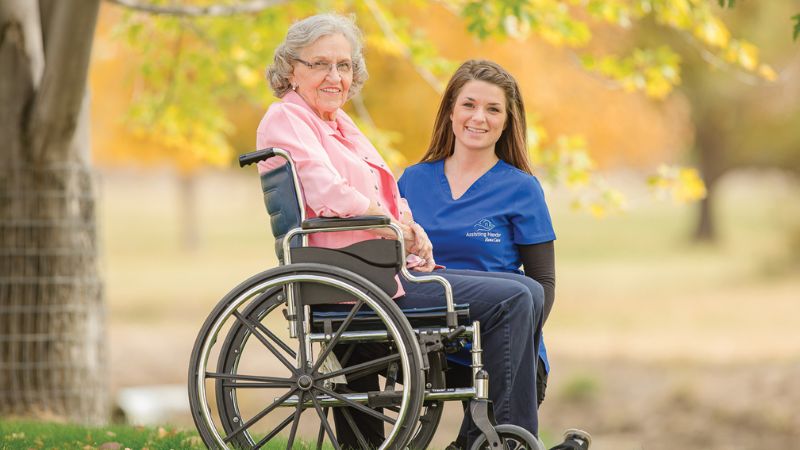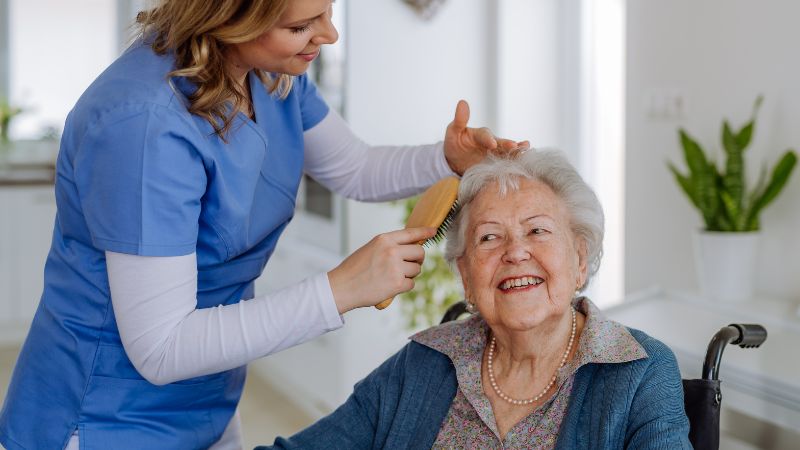
Caregivers are unable to change the course of illness affecting their bedridden elderly loved one, but they can change how they respond to the situation. Staying positive is essential for both the caregiver and the care recipient as it helps the former deliver quality care, and the latter feel valued.
Every day, 40 million Americans provide some form of elder care to a loved one. They escort seniors to doctors’ appointments, give medication reminders, prepare meals, and provide emotional support. But being a caregiver comes with a physical and emotional cost.
Feeling stretched to their limits, family caregivers can become overwhelmed. Burnout sends even the most dedicated caregivers spiraling into depression, anxiety, or exhaustion. The keys to avoiding negativity are to best support a senior who is bedridden and remain positive during the process.
How do caregivers support a senior who is bedridden?
Promote Good Hygiene
Ensure the aging care recipient feels clean and comfortable. Hygiene impacts an individual’s general well-being so be sure to bathe the seniors, brush their teeth, shave them, and cut their fingernails and toenails. Change their clothing to clean ones daily. Also change their bedsheets regularly.
Prevent Pressure Sores
Lying in the same position for lengthy periods can cause pressure sores, also known as bedsores. The ongoing pressure causes the skin to break down, leading to severe discomfort. Prevent this painful condition by changing the senior’s position every few hours and check the heels, hips, and tailbone for bedsores.
Change Bed Linens
Someone who is bedridden needs their sheets changed more often than most people. Linens can become soiled with food, dirt, skin particles, and bed baths. Change the linens every 2 to 3 days and ask the senior if the material is soft enough, too warm, or not warm enough.
Serve a Well-Balanced Diet
Nutrition is essential for the health of bedridden seniors, especially those who are in recovery after surgery or living with an illness. Serve healthy meals in accordance with their preference—some seniors snack throughout the day while others consume three meals. Keep water nearby to promote hydration.
Enhance Comfort
Since the bedridden senior spends most of their time in bed, their immediate surroundings should be comfortable. Offer extra pillows; ensure the room is well-ventilated and not too warm or cold; and position the bed near the nightstand so the senior can reach for books, water, and snacks.
Provide Emotional Support
Remaining in bed all day can lead to feelings of isolation, loneliness, and depression. Provide emotional support by reading to the senior, playing games, or engaging in conversations. Keeping the older adult stimulated and entertained promotes their mental health and well-being.
Stay in Contact with Healthcare Providers
Family caregivers must be attentive to the bedridden senior’s health, especially when care is provided at home. It’s important to keep track of their medication schedule, medical history, and noticeable changes to health. If concerning symptoms arise, contact the senior’s healthcare provider immediately.
Transfer the Senior Safely
Caring for a bedridden patient is physically demanding at times. Caregivers must transfer the senior safely to prevent bodily injury to themselves. When lifting the older adult, bend at the knees, keep the back straight, and use the leg muscles. Transfer belts and sliding boards can assist with transfers.
7 Tips on Being an Optimistic Caregiver
- Change Internal Dialogue: Along with fulfilling personal needs, caregivers are advised to adjust their internal dialogue to one that is positive. Caregivers achieve this by reminding themselves of the help they provide, making notes of the good things (a sunny day or a friend’s phone call), and rewarding themselves for their hard work.
- Take Breaks: Taking breaks also helps caregivers stay in a positive mindset. Remember that providing care to a bedridden senior is an endurance event rather than a sprint. Short breaks, even for 5 or 10 minutes, restore energy, reduce stress, improve focus, and help caregivers accomplish more.
- Laugh: Laughter enhances positivity. With each laugh, caregivers increase their intake of oxygen-rich air, stimulate endorphins in the brain, and calm stress. Find ways to enjoy a few laughs each day, whether that’s through listening to a comedian, reading, or talking to a friend.
- Accept Help: Accepting help is also highly beneficial in warding off stress and keeping caregivers positive. Involve others in the care process. Friends or family can prepare meals, handle household maintenance, or organize the senior’s finances. Respite care from home care agencies offers immeasurable relief.
- Prioritize Self-Care: It’s essential for caregivers to prioritize their own well-being. Taking time for self-care activities such as exercise, hobbies, or simply relaxation can rejuvenate the mind and body, fostering a positive mindset.
- Find Moments of Joy: Despite challenges, seek moments of joy and laughter in the caregiving journey. Whether it’s sharing a favorite activity with the loved one, enjoying a beautiful sunset together, or having a heartfelt conversation, cherish these moments and let them uplift spirits.
- Set Realistic Expectations: Setting realistic expectations in caregiving involves understanding that the journey will have its share of both triumphs and challenges. It’s essential to acknowledge that caregiving is not always smooth sailing; there will be moments of joy, progress, and satisfaction, but there will also be times of frustration, setbacks, and exhaustion.
Respite Care Services from Assisting Hands

Staying positive is accessible to caregivers, even when caring for a bedridden senior. Have confidence in the caregiver role, stay connected socially, and enlist respite care from Assisting Hands Home Care. We provide quality respite care services so that family caregivers receive a break from caregiving.
Professional respite care from our reputable home care agency resumes care where the family caregiver leaves off. Care remains uninterrupted as your aging loved one receives our full attention. We assist with hygiene tasks, give medication reminders, prepare healthy meals, and provide transportation to the doctor’s office.
Home health care is an invaluable service. The physical, emotional, and social health of the elderly are our priority. To achieve this end, we offer a comprehensive range of specialized non-medical care, including compassionate Alzheimer’s and dementia care, post-operative care, and hospice care.
Caregivers at Assisting Hands Home Care are licensed, bonded, and insured to give families and seniors peace of mind. We prioritize a good caregiver match and send a new professional if the original is not a fit. Care plans are also flexible and can be adjusted as care needs change.
Whether your aging loved one is bedridden or retains mobility, extra support from Assisting Hands Home Care is always appreciated. We are privileged to serve older adults living in Palos Hills and Homer Glen, Illinois. Schedule a free in-home consult and begin dependable respite or senior home care today.















